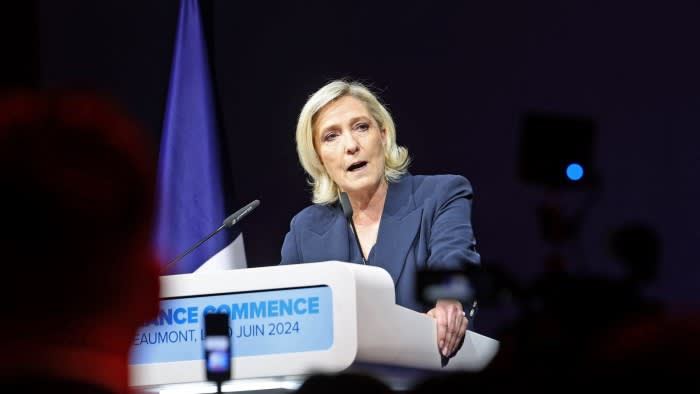This article is an onsite version of our Trade Secrets newsletter. Premium subscribers can sign up here to get the newsletter delivered every Monday. Standard subscribers can upgrade to Premium here, or explore all FT newsletters
Hello from Trade Secrets. A bad week for incumbents: a woeful US presidential debate performance by Joe Biden, a clobbering in the French parliamentary elections for Emmanuel Macron and, despite last night’s cheering last-minute England football victory, the Conservatives’ likely obliteration in this week’s UK general election. Today I look at the extent of cross-party consensus on trade in those countries, and why France is different. No Trade Secrets column this Thursday — I don’t want to distract British readers from casting their votes — so I’ll see you next Monday. Today’s Charted waters is on turnout in the French elections. Now, let me ask you: have I got it right about France? (French politics is always a fiendishly complex thing to judge.) Email me on alan.beattie@ft.com.
Plus ça change in Britain and the US . . .
First let me do my favourite thing and quote myself, in this case my contribution to last week’s FT Swamp Notes newsletter by the great Ed Luce, US commentator extraordinaire. I was asked to contrast the views of current US Trade Representative Katherine Tai and Trump’s USTR (and possible future Treasury secretary) Robert Lighthizer. Conclusion: despite being a liberal Democrat and a conservative Republican, not much difference.
[They have] a very DC strain of thinking that transcends liberal-conservative ideology and rewards specific narrow groups under the name of redistribution. Lighthizer and Tai are both lawyers, not economists. Both have spent decades as DC insiders. Both think you can fix trade deficits with trade policy, not macroeconomics.
Of course, Donald Trump in power is likely to prove far more aggressive and erratic than Biden. But there’s striking bipartisan agreement on the analysis, certainly compared with most other domestic issues — fiscal policy, the environment, healthcare and abortion. The centre of gravity of US trade policy has hopped in one bound from the mainstream Clinton-G W Bush-Obama consensus to one aggressively using tariffs and treating multilateral processes with disregard bordering on contempt.
If you look at the UK you see the same bipartisanship between the Tories and Labour (and the centre party, the Liberal Democrats) but with the consensus more or less staying the same over time — relatively supportive of open trade and multilateralism and signing trade deals. Right away I can hear Remainers telling me that this Tory government has been the most protectionist since at least the Great Depression, trade barriers thrown up with Britain’s biggest trading partner by far, and so on. They’re not wrong, but to be fair the Leave campaign — and the government’s actions since — were generally in favour of trading with both the EU and the rest of the world and have signed trade deals since. This includes agreements with some domestic political cost (if not much actual impact) such as the Australia deal, which alarmed British cattle farmers.
Obviously a lot of Leavers, former prime minister Boris Johnson being one, didn’t understand the world trading system, including the importance and nature of the EU single market, the Brussels Effect on regulation, the irrelevance of signing trade deals with countries 12,000 miles away, the simultaneous impossibility and pointlessness of a bilateral deal with the US, the strictly limited scope for establishing a radically different trade defence regime and much besides. But that was boneheaded ignorance, rank prejudice and hapless incompetence rather than protectionist intent.
Labour’s trade policy is mercifully lighter on signing pointless bits of paper with US states and realistic about not getting one with the federal government either. But still they’re keen on an India deal (prediction: they might get one, but it won’t have much in it) plus standalone bilateral services and digital deals (ditto, ditto). For general ideology towards trade Labour aren’t a huge change from the Tories: what distinguishes them is a much less virulent neurosis over the EU.
. . . but (perhaps) all change in France
Which brings us to France. France is different. (France is often different.) A Marine Le Pen presidency, unless she balks at implementing her programme, would be a marked change from Macron’s. That’s less because her worldview on global trade is massively different than that her domestic policies would severely weaken the EU from within.
It may be insufficiently appreciated outside the EU that Macron’s enthusiasm for economic liberalisation tends to stop at the French border. At an EU level France has been as interventionist over trade as ever. Macron is the main obstacle in either trading bloc to ratifying the giant EU-Mercosur trade deal. Paris wants to erect big hurdles for agricultural imports to the EU by creating “mirror clauses” requiring trading partners to match EU standards on the environment and food hygiene. France’s hyperactive commissioner Thierry Breton has never seen an industrial policy or an instrument to use against China he didn’t like. And so on.
Where Macron has largely stopped short is any intervention that would seriously weaken the internal market from its current state, and that’s the most dangerous part of Le Pen’s platform. Repatriating France’s EU budget contribution, limiting immigration to France from inside the EU, tearing up public procurement rules: these are lethally dangerous for the EU project. Crudely speaking, and exaggerating considerably for emphasis, she’s doing to the EU what France has long argued the EU should do to the rest of the world.
As I’ve said before, current and previous rightwing populists such as Giorgia Meloni in Italy (and the Five Star Movement and the League before her) have unsavoury views on immigrants but are reasonably keen on the internal market and external trade. Le Pen is different. France often is. This is seriously very worrying stuff. The optimistic case is that she’s ditched a lot of her really extreme views (like withdrawing from the euro) before and will do so again. But in practice she may feel the space has opened up more for her party to be true to itself.
Charted waters
Not just radical policies but energised voters: France’s election yesterday showed a big surge in votes compared with previous episodes. It will be hard to argue that this election doesn’t suggest a big demand for change.

Trade links
Demonstrations against tax increases in Kenya to deal with the country’s severe sovereign debt crisis, which ended with protesters shot dead by police, underline the debt problem plaguing many low and middle-income countries amid debates about whether the IMF or China is more to blame.
My esteemed colleagues Peter Foster and Andy Bounds look at what a constructive Labour government could do to improve trade with the EU.
One bit of cheer for Brussels: a Eurobarometer poll shows nearly three-quarters of citizens of EU countries think the bloc rather than individual member states is the best place to set trade policy.
From a few weeks ago, a paper from the Hinrich Foundation examines whether rules of origin are likely to be the next flashpoint in trade disputes, especially in the US.
An interesting paper from Tulip Consulting for the Brussels-based NGO Transport and Environment looks at how EU trade deals could better be used to promote sustainability in deals over critical raw materials.
The FT’s Lex column looks at possible investment returns in emerging markets.
Trade Secrets is edited by Jonathan Moules
Recommended newsletters for you
Also Read More: World News | Entertainment News | Celebrity News









